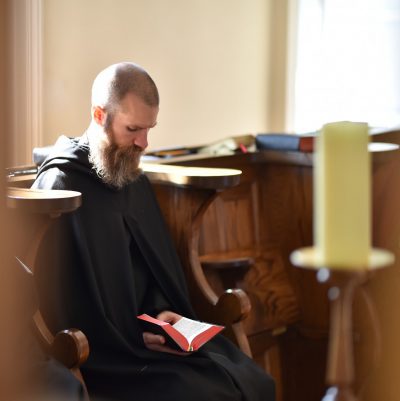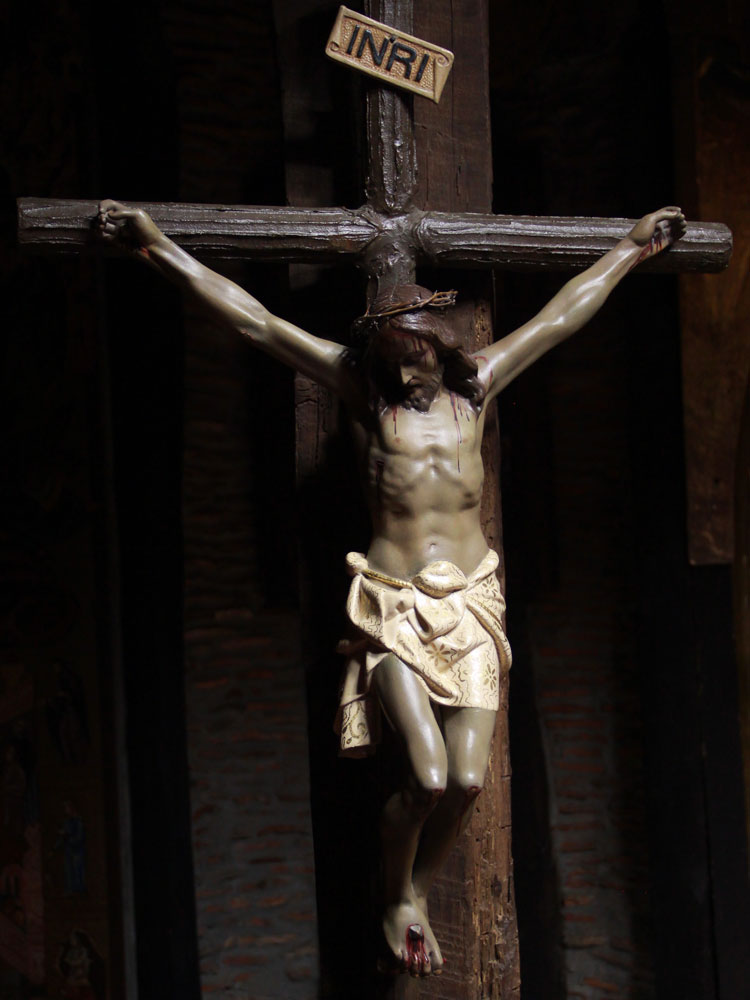Their weakness must be taken into account (XLVIII:3)

CHAPTER XLVIII. Of the daily manual labour
30 Mar. 30 July. 29 Nov.
On Sunday, let all occupy themselves in reading, except those who have been appointed to the various offices. But if any one should be so negligent and slothful, as to be either unwilling or unable to study or to read, let some task be given him to do, that he be not idle. To brethren who are weak or delicate, let there be given such work or occupation as to prevent them either from being idle, or from being so oppressed by excessive labour as to be driven away. Their weakness must be taken into account by the Abbot.
For Saint Benedict, Sunday, the Day of the Lord, is dedicated to holy reading. Dominico item die lectioni vacent omnes, excepto his qui variis officiis deputati sunt. He makes an exception for those appointed to various offices or services. There are certain tasks that must be carried out even on Sunday: the work, for example, of the kitchen, refectory, sacristy, infirmary, guesthouse, and porter’s lodge. Where there are animals, they must be fed and watered, even on Sunday. The monks who find themselves free of such tasks, will devote all of Sunday to reading, that is, all of the time that remains after the Opus Dei, meals, and rest. Dom Jean Leclercq dedicated an entire book to the notion of reading, that is, of learning, in the monastic tradition: The Love of Learning and the Desire for God.
It emerges from the Holy Rule that that reading and study are, before all else, ordered to the Opus Dei, to learning to read and chant the psalms, antiphons, lessons, responsories, hymns, and collects that constitute our daily worship. The Holy Sacrifice of the Mass, especially in the form of the daily conventual Mass is part of the Opus Dei; it is the centre towards which all the Hours converge, and from which they radiate through the day and night.
Reading and study are also ordered to acquiring the knowledge of divine things or, if you will, to theology. A monk never stops, however, at the mere knowledge of divine things; he seeks, above all else, to acquire the knowledge of God that comes through faith and is perfected in charity. Although a monk must apply himself to learning the science of divine things at his desk, and in the library, and in listening to lectures, the principal and highest locus of his learning is his choir stall. In Chapter XIX, Saint Benedict says, Psallite sapienter, “Sing ye wisely”, and again, Sic stemus ad psallendum ut mens nostra concordet voci nostrae, “Let so so assist at the psalmody that our mind is at one with our voices”. For a monk, the choir is the auditorium sapientiae, the place in which one hears wisdom and begins to taste (sapere) the things of God.
Finally, at the time of prayer, a monk’s reading is ordered directly to union with God. It is risky and extremely foolish to think that, apart from a special grace, one can dispense with reading at the time of prayer. The monk who tries to do this, unless he has been granted the gift of infused contemplation, will find himself daydreaming, or distracted by a multitude of things, or in a state of complete dryness. As a rule, our prayer takes the form of adoration (ad–oratio, i.e. praying–toward) the Sacred Host, Our Lord’s real presence; this in no way dispenses us from the ordinary need to go to prayer from reading.
It is a pity that in English we do not have a proper word for the secret, intimate prayer that the Spanish call oración and the French oraison. The English word oration corresponds neither to oración nor to oraison. The words meditation and contemplation are contaminated by the meanings attributed to them in the Ignatian, Sulpician, and other modern schools of prayer. The expression “mental prayer” is unfortunate; it connotes something that takes place in one’s head. At the end of the day, I am quite happy to use the word adoration in reference to the personal prayer of a monk outside of the Opus Dei, especially since we tend to prefer to pray in the presence of the Most Blessed Sacrament. Ours is, effectively, an ad–oratio, a prayer–towards Our Lord really present in the Sacrament of His Love.
• Lectio. Prayer, like a conversation between two friends, begins with a loving greeting. This greeting may take the form of an act of adoration expressing faith, hope, and charity . It may be condensed to a very few words, and may take the form of saying something like, “I am here for Thee because Thou art here for me”. One may want to read a few lines, more or less, from the Gospels or from the book one has at hand, or from the passages that one has copied into one’s notebook. This reading is a way of hearkening to the word of God or, at least, a way of inclining the ear of the heart to Him. The point is not to devour a book; it is, rather, to read until a word or phrase seizes the attention of one’s heart.
• Meditatio. One will want to repeat or even to write out the word or phrase that has seized the attention of one’s heart. I have always found that copying out a text is a simple but effective way of allowing the word to pass, in some way, from the page, through the muscles of the writing hand, up the arm, and into the heart. Writing out texts may not suit everyone but it is, nonetheless, a traditional monastic way of repeating the word and of storing it up in one’s memory. Repetition allows the word to find a home within oneself. “If you abide in me, and my words abide in you, you shall ask whatever you will, and it shall be done unto you.” (John 15:7)
• Oratio. What shall I call the simple short prayers that rise out of one’s reading? They are like fiery arrows shot out of the heart in the direction of the Sacred Host. One should have an arsenal of these short invocations and be prepared to repeat them until they give way to a kind of silent gazing: “It is Thy face, O Lord, that I seek; hide not Thy face from me” (Psalm 26:8–9).
• Contemplatio. This prayer of gazing is marked by a kind of yearning, a pull of the heart towards Our Lord present in the Most Holy Sacrament, a movement of desire for union with Him
When the movement becomes slack, one returns to reading a little, to repetition (meditatio), and to making short acts of prayer (oratio). As soon as the sparks of prayer enkindle a slow–burning fire of yearning, one can return to the simple prayer of gazing. All of this being said, there is no rigid method here. One may pass imperceptibly from one of the four ways of prayer to another several times in the course of the time set aside, or one may remain in one of the four ways for the whole time. There is nothing scripted or calculated about the prayer of adoration. It is, according to the lovely expression of Père Jérôme of Sept–Fons, the transposition of the acts of human friendship to one’s relationship with Our Lord. What does a friend seek if not be in the presence of the one he loves, and this as frequently and for as long as possible?

